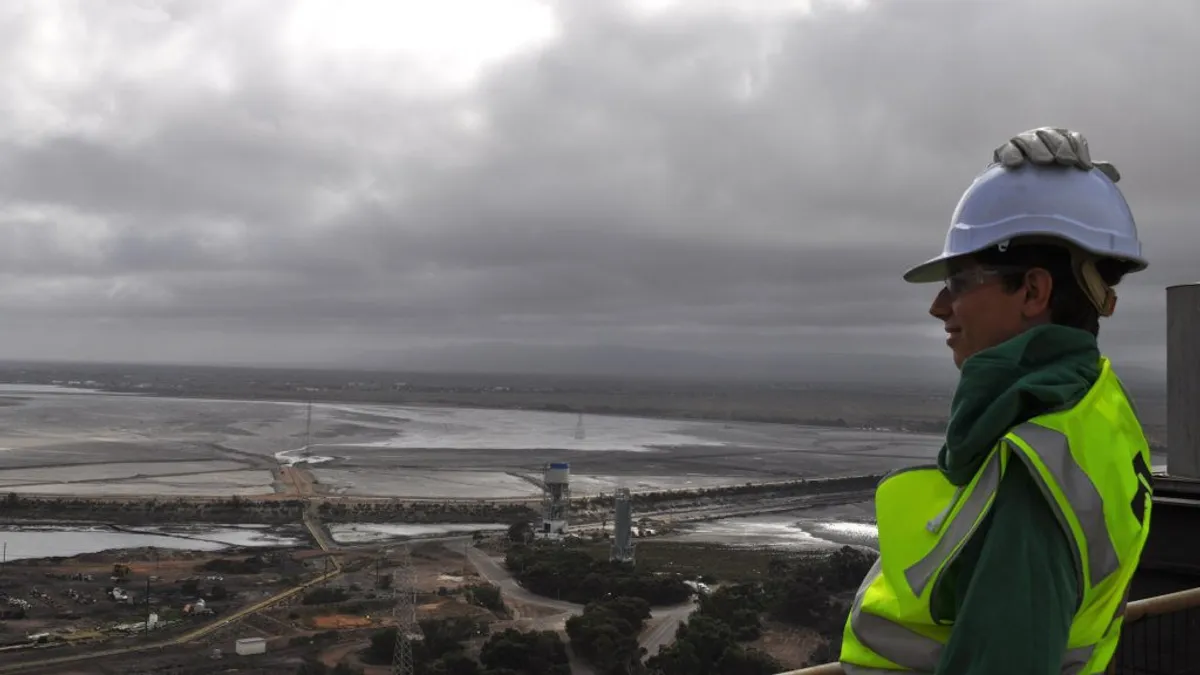Dive Brief:
-
Georgia will become the second state to operate its own coal ash permitting program, the U.S. Environmental Protection Agency announced Thursday.
-
The approval coincides with a proposal by the agency to issue new federal permits for coal ash disposal, expected to save less than $1 million annually. The proposal specifically addresses states that don't operate their own permitting — every state except Georgia and Oklahoma — and sites on Native American land.
-
EPA first recommended Georgia be allowed to operate its own coal ash program in June as part of its efforts to give states more "flexibility" in how they clean up the waste product and its toxins.
Dive Insight:
President Donald Trump's EPA has been rolling back pieces of the Obama era coal combustion residual (CCR) rules — written in response to coal ash spills that triggered the release of thousands of tons of toxins into the surrounding environment — since March of 2018.
Many of the rules are an effort to give states more leeway in how they clean up and manage their coal ash.
Thursday's move gives Georgia the ability to operate its own permitting program without federal oversight. Their permitting process "largely mirrors" the federal coal ash rule, Southern Environmental Law Center attorney April Lipscomb told Utility Dive in June, but the state will require utilities to apply for and get individual permits at each of their coal ash units.
"Placing implementation of coal ash regulations more fully into the hands of the State of Georgia empowers those with local expertise to oversee these operations, which is a safer and more effective approach to disposal," EPA Administrator Andrew Wheeler said in a statement. Oklahoma is the only other state allowed to operate its own permitting program, authorized by the EPA in June of 2018.
Environmentalists worry that allowing states to operate their own permitting programs will hinder the ability of groups and individuals to file citizen suits if environmental concerns are realized.
Currently, Georgia Power, the state's largest electric utility has plans to excavate 19 of its 29 coal ash pits and leave the remaining 10 capped in place.
Though the utility is using "advanced engineering" on the capped coal ash ponds, including dewatering the facilities, a study commissioned by the Southern Environmental Law Center (SELC) found several of those ponds may be sited in groundwater.
Permits from the state's Environmental Protection Division are still pending though state regulators recently approved an initial $1.8 billion addition to Georgia Power's rate base, with the "lion's share" going toward coal ash clean up, according to Public Service Commissioner Tim Echols. The utility has been unable to specify how much of that amount will go toward coal ash remediation.
Sierra Club told Utility Dive they are considering appealing the Georgia Power rate decision, particularly if there's evidence the utility's coal ash management is in violation of state or federal laws.
Meanwhile, the EPA's program for the other 48 states and Native American reservations will cover permitting for operating ponds and landfills as well as outline a clean up methodology for units that have been shut down. The agency is required to develop a permit program under the 2016 Water Infrastructure Improvements for the Nation Act.
"EPA has used the lessons learned from many years of implementing hazardous waste and other permitting programs to design an efficient, federal CCR permitting process," the agency said in a statement. "Issuance of a permit will provide increased clarity to owners and operators of units about their obligations because the rule requirements can be tailored to specific conditions at the unit."
Environmental lawyers are concerned about the proposed rule, noting the permit program does not include a review to see if facilities are in compliance with federal requirements, does not acknowledge site specific dangers, such as if the pond is on a floodplain, and the permits don't expire.
"It is, pure and simple, a holiday gift to polluters," Earthjustice attorney Jenny Cassel said in a statement.
EPA will open a 60 day comment period on the proposed permitting program 60 days after it's published in the federal registrar and will hold a virtual public hearing. Earthjustice calls the virtual hearing a "cop out."
"This is the second time the Trump administration has issued a proposal on coal ash that refuses to hold in-person public hearings so that the officials can face families whose lives have been devastated by coal ash," said Cassel.














